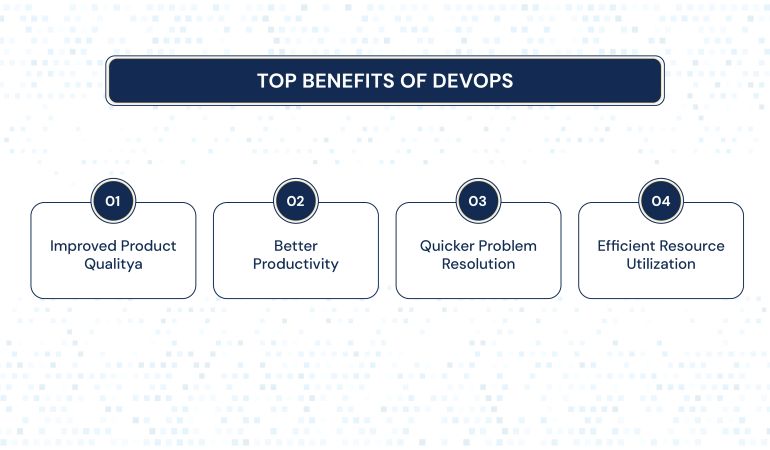As digital transformation picks pace and companies shift to software and mobile applications to meet rapidly changing market dynamics, DevOps is gaining currency as a software development approach. This article will discuss DevOps consulting services, their benefits, and their key principles and practices. We will then discuss DevOps as a service and its benefits.
Let’s start!
What is DevOps?
DevOps is a set of practices that aims to improve collaboration and communication between software development (Dev) and information technology operations (Ops) teams.
The primary goal of DevOps is to shorten the software development life cycle, enhance the delivery frequency, and ensure high-quality software releases. It promotes a culture of collaboration, automation, and continuous improvement.
Fundamental principles and practices of DevOps include:
- Collaboration: DevOps is all about breaking down silos between development and operations teams. The goal is to foster better communication and collaboration to improve efficiency and reduce development time.
- Automation: Automation is a critical DevOps component. It aims to streamline and automate the software development and deployment processes to increase efficiency and reduce manual errors.
- Continuous Integration (CI): CI refers to merging code changes from multiple contributors into a shared repository frequently. This enables early detection of integration issues.
- Continuous Delivery (CD): CD automates deploying code changes to production or other environments. It ensures a reliable and repeatable release process, allowing software development services companies to reduce time to market.
- Infrastructure as Code (IaC): IaC refers to managing and provisioning infrastructure using code. It allows for consistency and automation in infrastructure setups.
- Monitoring and Logging: Monitoring and logging are essential DevOps practices. They involve implementing tools and practices to continuously monitor applications and infrastructure, enabling quick issue identification and resolution.
- Feedback Loops: Feedback loops enable better collaboration by establishing mechanisms for obtaining feedback on the software development and deployment processes, facilitating continuous improvement.
Best Practices for the DevOps Life Cycle
Some of the best practices for executing the DevOps lifecycle are listed below.
- Develop a culture of collaboration and effective communication among development, operations, and other teams involved in the software delivery process. Promote frequent meetings, cross-functional collaboration, and the utilization of collaboration tools to ensure alignment and shared goals among all stakeholders.
- Implement agile methods and techniques like user stories, backlog management, and sprint planning to work prioritization and tracking.
- Enforce code review processes to validate code quality, facilitate knowledge exchange, and resolve potential issues.
- Automate testing as much as possible to validate efficient and accurate test execution.
- To automate and orchestrate tests, utilize testing tools and frameworks such as Testsigma, Selenium, JUnit, and Postman.
- Adopt Continuous Integration and Delivery: Create sound CI/CD pipelines that perform automated build, testing, and deployment. Continuously integrate code modifications, conduct automated testing, and release infrequently but often to reduce risk and achieve speedy feedback loops.
- Invest in Continuous Feedback and Monitoring: Establish an extensive monitoring system to develop insights into app performance, user activity, and system health. Use monitoring software and analytics to identify problems, spot areas for improvement, and collect feedback from end-users.
- Foster Learning and Ongoing Improvement: Foster a learning culture, experimentation, and ongoing improvement. Encourage the teams to share knowledge, go to industry events, undergo training programs, and try out new tools and technology.
- Foster Cross-Team Collaboration: Collaboration must go beyond development and operations teams. Engage other stakeholders, including QA, security, and product management, in the DevOps process to achieve a comprehensive approach and shared responsibility for the software delivery lifecycle.
Benefits of DevOps Methodology
Companies accrue so many benefits from employing a DevOps approach to software development. Here are some of the leading benefits of DevOps:

- Improved Product Quality: Feedback loops and collaboration allow companies to release better products. Activities like automated testing help quickly find bugs and errors without impacting pipeline velocity.
- Lower Costs: DevOps has the power to transform your entire development setup and reduce your overall costs. When you start removing inefficient processes and elements and streamlining existing ones, you will see a marked cost reduction.
- Better Productivity: A key benefit of DevOps is that it offers a flexible and agile development pipeline. Your development and operations teams can adjust as the need arises, allowing overall productivity to increase. This gives you a competitive edge over companies that are still using traditional development approaches like agile and waterfall.
- Quicker Problem Resolution: DevOps is more of a culture. When you foster it in your company, you’re not only able to find problems much more quickly but also resolve them. It also has a positive side effect – your teams become much more motivated in an efficient culture like DevOps.
- Efficient Resource Utilization: Automation frees up your resources to do other tasks. And since automation is an essential DevOps practice, you can expect to leverage your resources more efficiently by employing leading DevOps tools. All this means better productivity, lower costs, and better profits!
What is DevOps as a Service?
Not every company has the resources to implement a DevOps approach for their software development needs. This is where DevOps-as-a-Service (DaaS) comes into play. It refers to delivering top DevOps tools, practices, and expertise as a managed service using a cloud-based model.
DevOps service providers offer their expertise to other companies looking to benefit from this approach but cannot implement it themselves due to a lack of requisite skills or resources. Using a collaborative software development approach, DaaS enables companies to develop high-quality software quickly.
Since DevOps is a culture driven by practices, tools, and development approaches, it naturally encompasses the entire organization. When you choose DevOps as a managed service, you can still reap the same benefits of flexibility, agility, and efficiency if you implement DevOps in-house.
DaaS offers the same cultural mindset of continuous delivery as an in-house DevOps approach. This makes it an excellent option for companies lacking internal resources, as they don’t have to pay for ownership costs or training.
Moreover, using a cloud consulting services model allows DaaS providers to offer their expertise with agility and flexibility. They manage the entire development pipeline for you, and your teams can easily access it. This simplifies all DevOps-related activities, including tool selection, management, and maintenance.
What is the DaaS Pipeline?
A DaaS pipeline generally has several stages, each determined by the tools and practices used. The process begins with version control, where developers commit code changes. Then, a version control system, such as Git, tracks and manages code repositories.
This is followed by CI/CD, where CI (continuous integration) automates the build and testing of code changes to ensure integration compatibility and code quality. CD (continuous delivery) then automates code change deployment to staging or testing environments. This automated testing makes sure that your application is ready to be sent for production.
Some pipelines also include continuous deployment, where successful CI/CD results in automatic deployment to the production environment.
Next comes infrastructure as code (IaC). This stage of the pipeline enables you to define and manage infrastructure using code, helping you maintain consistency and reproducibility.
The monitoring and logging stages involve implementing tools to collect and analyze data, enabling the tracking of application and infrastructure performance. This is also where DaaS experts integrate communication tools that facilitate efficient interaction between development and operations teams, promoting seamless information sharing.
Most importantly, DaaS providers weave security practices throughout the development pipeline. They incorporate security scans during CI/CD and address vulnerabilities by providing regular updates for dependencies. Moreover, they utilize security testing tools to find and resolve potential vulnerabilities and issues.
All these stages combine to form a comprehensive and cohesive automated pipeline that raises software delivery efficiency and quality.
Reasons Why You Need DevOps as a Service
Outsourcing DevOps to a third-party service provider has many advantages, so companies often choose DevOps-as-a-service.

-
Access to Talent
One of the most important reasons companies choose managed DevOps services is that they have access to highly skilled resources who are experts in implementing DevOps. These are certified DevOps engineers, and having access to them can be a game-changer for your organization. You must spend very little or no money to train them—you need to bear onboarding costs. This is also why companies offering staff augmentation services have high-quality DevOps resources that others can hire temporarily.
-
Faster Delivery Speed
Choosing cloud DevOps services entails having a managed service provider (MSP) handle critical development tasks for your organization. Whether it’s managing DevOps infrastructure for continuous testing or developing team strategy to bolster cross-functional collaboration, your cloud-managed services provider will inject value directly into your software development lifecycle (SDLC).
-
Limit HR Risks
If recruitment and human resource management are tasks you don’t want to involve yourself in, go for DevOps-as-a-service. Your DaaS provider will look after all your human resource management needs insofar as they relate to DevOps-managed services.
From training to development monitoring and office space, a managed service provider ensures your DevOps is done correctly. All you need to do is select the right resources from the MSP’s talent pool – choose resources likely to gel in with your teams and company culture.
-
Lower Costs
Are you looking to employ a more cost-effective method to develop software applications? DevOps as a service is the way to go. You don’t have to build an in-house team for it; you can hire a DevOps services provider. For example, many companies out there offer AWS DevOps services. The price of DevOps in the IT industry is much lower than that of creating a team of AWS-certified resources.
-
Improve Collaboration
Another reason why companies choose to purchase DevOps services is that managed DevOps service providers help you improve collaboration by removing silos and fostering a culture of teamwork. Moreover, as a service provider, DevOps has a team of specialists that cover all the skills you need – these specialists share their expertise with your team members and help increase their knowledge.
Conclusion
DevOps can benefit you in many ways, whether you’re a budding startup or a well-established IT firm. However, choose a DaaS provider if you lack DevOps skills and expertise. DevOps as a service has the power to bring radical improvements in your software development approach and organizational culture.
Xavor is a leading tech firm based in Irvine, California, with a presence in China and Shanghai. We have AWS and Azure-certified experts who can fulfill all your DevOps needs. Our managed cloud services deliver end-to-end cloud solutions that help you achieve your business goals more efficiently in an age of digital transformation.
Contact us at [email protected] to learn more about Xavor’s DevOps & Cloud solutions!

